Education and morality 教育与道德-英语作文
有关道德和美德的英语作文必修三
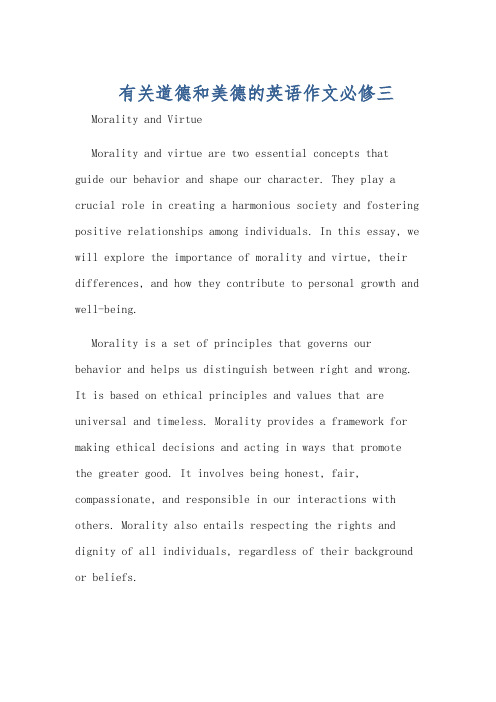
有关道德和美德的英语作文必修三Morality and VirtueMorality and virtue are two essential concepts that guide our behavior and shape our character. They play a crucial role in creating a harmonious society and fostering positive relationships among individuals. In this essay, we will explore the importance of morality and virtue, their differences, and how they contribute to personal growth and well-being.Morality is a set of principles that governs our behavior and helps us distinguish between right and wrong. It is based on ethical principles and values that are universal and timeless. Morality provides a framework for making ethical decisions and acting in ways that promote the greater good. It involves being honest, fair, compassionate, and responsible in our interactions with others. Morality also entails respecting the rights and dignity of all individuals, regardless of their background or beliefs.Virtue, on the other hand, refers to the qualities or traits that are considered morally good and desirable. Virtues such as honesty, integrity, courage, and kindness are seen as essential for leading a fulfilling and meaningful life. Cultivating virtues helps us develop a strong moral character and enables us to overcome challenges and adversities with grace and dignity. Virtues also contribute to building trust and credibility in our relationships with others, as they demonstrate our commitment to ethical behavior and integrity.While morality and virtue are closely related, they are not synonymous. Morality provides the foundation forethical behavior, while virtue represents the qualities and traits that embody moral excellence. In other words, morality dictates what is right and wrong, while virtue guides us in embodying those principles in our actions and decisions.Both morality and virtue are essential for personal growth and well-being. By adhering to moral principles and cultivating virtues, we develop a strong sense of self-awareness, integrity, and resilience. We become morecompassionate, empathetic, and understanding towards others, leading to deeper and more meaningful relationships. Additionally, practicing morality and virtue can enhanceour sense of purpose and fulfillment, as we align ouractions with our values and beliefs.In conclusion, morality and virtue are fundamental concepts that shape our character and guide our behavior.By upholding moral principles and cultivating virtues, we can contribute to a more ethical and compassionate society, while also experiencing personal growth and fulfillment. It is essential to prioritize morality and virtue in our lives, as they provide the foundation for leading a meaningful and purposeful existence.道德与美德道德和美德是指导我们行为和塑造我们性格的两个重要概念。
道德与美德英文作文
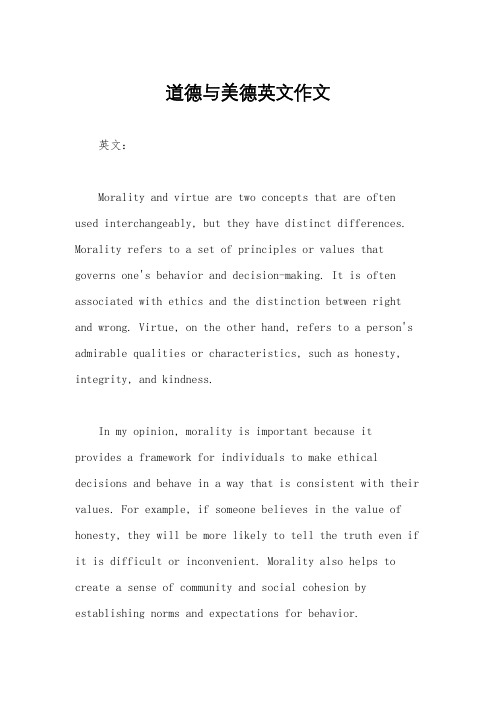
道德与美德英文作文英文:Morality and virtue are two concepts that are often used interchangeably, but they have distinct differences. Morality refers to a set of principles or values that governs one's behavior and decision-making. It is often associated with ethics and the distinction between right and wrong. Virtue, on the other hand, refers to a person's admirable qualities or characteristics, such as honesty, integrity, and kindness.In my opinion, morality is important because it provides a framework for individuals to make ethical decisions and behave in a way that is consistent with their values. For example, if someone believes in the value of honesty, they will be more likely to tell the truth even if it is difficult or inconvenient. Morality also helps to create a sense of community and social cohesion by establishing norms and expectations for behavior.Virtue, on the other hand, is important because it reflects a person's character and can influence how others perceive them. For example, someone who is known for their kindness and compassion is more likely to be respected and admired by others. Virtue also contributes to personal fulfillment and happiness by allowing individuals to livein accordance with their values and beliefs.In my personal experience, I have found that both morality and virtue are important in my daily life. For example, I try to live by the principle of honesty and integrity in my interactions with others, and I also strive to cultivate virtues such as empathy and compassion. These values and qualities have helped me to build strong relationships with others and to feel fulfilled in my personal and professional life.中文:道德和美德是两个常常被混淆的概念,但它们有着明显的区别。
以德为先立德树人英语作文
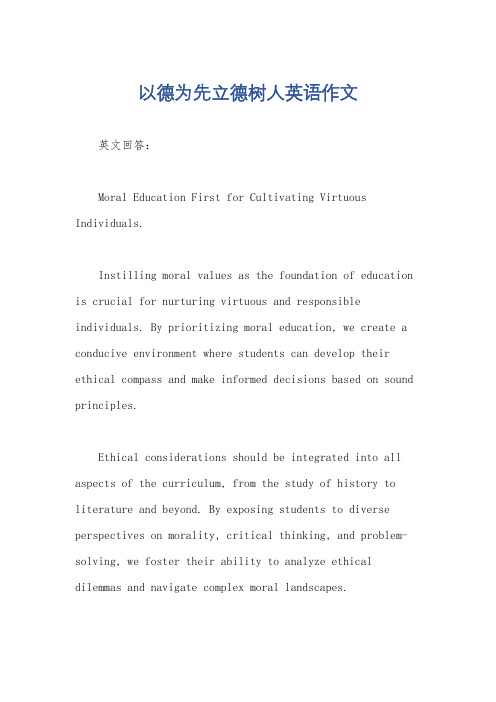
以德为先立德树人英语作文英文回答:Moral Education First for Cultivating Virtuous Individuals.Instilling moral values as the foundation of education is crucial for nurturing virtuous and responsible individuals. By prioritizing moral education, we create a conducive environment where students can develop their ethical compass and make informed decisions based on sound principles.Ethical considerations should be integrated into all aspects of the curriculum, from the study of history to literature and beyond. By exposing students to diverse perspectives on morality, critical thinking, and problem-solving, we foster their ability to analyze ethical dilemmas and navigate complex moral landscapes.Equally important is the role of educators in exemplifying moral values in their interactions with students. Teachers and administrators should embody the principles they teach, serving as role models of integrity, compassion, and respect. By creating a culture of respect and empathy, schools can promote a positive and supportive learning environment where students feel valued and encouraged to grow morally.Moreover, schools should establish clear moral guidelines and expectations to provide students with a framework for ethical behavior. These guidelines should be communicated effectively and enforced consistently, ensuring that students understand the consequences of their actions and are held accountable for their moral choices.Furthermore, involving families and the community in moral education is essential to reinforce the values taught in school. Parents and guardians play a vital role in shaping their children's moral development, and by collaborating with educators, they can create a cohesive and supportive environment for fostering ethical behavior.By prioritizing moral education first, we empower students with the knowledge, skills, and values necessaryto make responsible decisions, contribute positively totheir communities, and lead virtuous lives. It is through the cultivation of ethical individuals that we build a just and harmonious society.中文回答:以德为先立德树人。
道德教育的意义英语作文

道德教育的意义英语作文The Significance of Moral Education。
Introduction:Moral education plays a crucial role in shaping the character and values of individuals. It is an essential aspect of education that goes beyond academic knowledge and equips students with the necessary skills to navigate through life. This essay aims to explore the significance of moral education and its impact on individuals and society.Body:1. Fostering ethical behavior:Moral education instills ethical values in individuals, promoting honesty, integrity, and empathy. It teaches students to differentiate between right and wrong, enablingthem to make ethical decisions and take responsibility for their actions. By cultivating a sense of morality, individuals become more conscientious and contribute positively to society.2. Developing social skills:Moral education emphasizes the importance of respect, cooperation, and tolerance, which are crucial for building healthy relationships and fostering a harmonious society. Students learn to appreciate diversity and accept others' perspectives, leading to better communication and cooperation in various social settings.3. Cultivating empathy and compassion:Through moral education, individuals develop empathy and compassion towards others, fostering a sense of kindness and understanding. This enables them to connect with people from different backgrounds and cultures, promoting inclusivity and reducing discrimination and prejudice.4. Nurturing responsible citizenship:Moral education plays a vital role in nurturing responsible citizens who actively contribute to their communities. It teaches individuals the importance of civic duties, such as voting, volunteering, and respecting the law. By instilling a sense of social responsibility, moral education empowers individuals to actively participate in creating a better society.5. Enhancing decision-making skills:Moral education equips individuals with critical thinking and decision-making skills. By presenting ethical dilemmas and discussing their implications, students learn to analyze situations from multiple perspectives and make informed choices. This helps them navigate complex moral issues and make ethical decisions in their personal and professional lives.6. Promoting personal well-being:Moral education focuses on the holistic development of individuals, including their emotional and mental well-being. It promotes self-reflection, self-discipline, and self-awareness, enabling individuals to develop a strong sense of identity and purpose. By nurturing their mental and emotional health, moral education contributes tooverall well-being.Conclusion:Moral education is of paramount importance as it shapes individuals' character, values, and behavior. By fostering ethical behavior, developing social skills, cultivating empathy and compassion, nurturing responsible citizenship, enhancing decision-making skills, and promoting personal well-being, moral education plays a significant role in creating a better society. It is essential for educational institutions to prioritize moral education alongside academic knowledge to ensure the holistic development of individuals.。
英语作文关于道德

英语作文关于道德公司内部档案编码:[OPPTR-OPPT28-OPPTL98-OPPNN08]原文:道德与教育每个人都认识到国力的强大依靠教育。
教育水平越高,国家就越强盛,这是千真万确的。
但我的观点是,为了国家的强盛,单独的教育是不够的,教育与道德应双管齐下,不能偏颇。
道德与教育是国家的基石,缺少任何一个,成功都是不可能的。
没有道德的教育是危险的,而没有教育的道德是有害的。
译文:Morality and EducationIt is recognized by everybody that the strength of a country depends upon its education. The higher the education standards, the stronger the country becomes. That is true indeed.But my opinion is that, in order to make a country strong, education alone is not sufficient. It should go side by side with morality.. Morality and education are the foundation of a country. The absence of either makes success impossible. Education without morality is dangerous. Morality without education is also harmful.(汉语)我曾经读过意大利诗人但丁说的一句话:“一个知识不全的人可以用道德去弥补,而一个道德不全的人却难以用知识去弥补。
”这句话让我明白了知识与道德的关系,也感觉到道德的重要性。
其实,“道德”就是在别人有困难的时候,伸出你的援助之手。
道德 英语作文

In today's increasingly diverse and interconnected world, the cultivation of morality becomes more complex, as individuals from different cultural backgrounds may hold varying beliefs and values. In such a context, it is essential to promote universal moral principles that transcend cultural and religious boundaries, such as respect for human dignity, fairness, and empathy. By recognizing the common humanity that binds all people, individuals can embrace diversity while upholding shared moral standards that foster understanding and harmony.
1. The significance of morality
Morality serves as the foundation for ethical decision-making and responsible conduct. It encompasses a set of principles that govern how individuals should behave towards others and what is considered right or wrong. Without a moral compass, society would descend into chaos, as there would be no guiding principles to regulate behavior and resolve conflicts. Therefore, the cultivation of moral values is essential for building a harmonious and prosperous community.
有关道德和美德的英语作文必修三
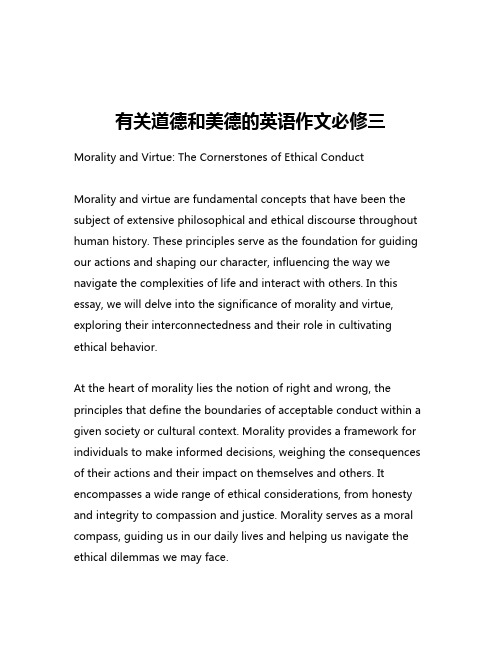
有关道德和美德的英语作文必修三Morality and Virtue: The Cornerstones of Ethical ConductMorality and virtue are fundamental concepts that have been the subject of extensive philosophical and ethical discourse throughout human history. These principles serve as the foundation for guiding our actions and shaping our character, influencing the way we navigate the complexities of life and interact with others. In this essay, we will delve into the significance of morality and virtue, exploring their interconnectedness and their role in cultivating ethical behavior.At the heart of morality lies the notion of right and wrong, the principles that define the boundaries of acceptable conduct within a given society or cultural context. Morality provides a framework for individuals to make informed decisions, weighing the consequences of their actions and their impact on themselves and others. It encompasses a wide range of ethical considerations, from honesty and integrity to compassion and justice. Morality serves as a moral compass, guiding us in our daily lives and helping us navigate the ethical dilemmas we may face.Virtue, on the other hand, refers to the positive character traits and moral excellence that individuals strive to cultivate within themselves. Virtues such as courage, temperance, wisdom, and justice have been revered throughout history as hallmarks of moral character. These virtues are not merely abstract concepts but rather tangible qualities that shape our behavior and interactions with others. When we embody and exemplify these virtues, we demonstrate a commitment to ethical conduct and a desire to contribute positively to our communities.The relationship between morality and virtue is symbiotic and interdependent. Morality provides the ethical principles that guide our actions, while virtue represents the personal qualities and habits that enable us to uphold those principles. Individuals who possess a strong sense of morality are more likely to develop and exhibit virtuous traits, as they strive to align their actions with their ethical beliefs. Conversely, the cultivation of virtue can deepen our understanding and internalization of moral principles, leading to more consistent and principled behavior.One of the primary functions of morality and virtue is to foster social cohesion and collective well-being. When individuals within a society adhere to shared moral standards and cultivate virtuous traits, they are more likely to engage in cooperative and mutually beneficial interactions. This, in turn, contributes to the creation of a harmoniousand stable social fabric, where trust, respect, and reciprocity become the foundation for interpersonal relationships.Moreover, the importance of morality and virtue extends beyond the individual level, as they play a crucial role in shaping the ethical foundations of institutions, organizations, and systems. Leaders and decision-makers who embrace moral and virtuous principles are more likely to make choices that prioritize the common good over narrow self-interest. This, in turn, can lead to the development of policies, laws, and structures that promote the well-being of all members of society, rather than catering to the privileged few.However, the cultivation of morality and virtue is not without its challenges. In today's complex and rapidly changing world, individuals are often confronted with ethical dilemmas that test the limits of their moral compass. The temptation to prioritize personal gain over the greater good, the influence of societal pressures and biases, and the ambiguity of certain ethical situations can all pose obstacles to the consistent application of moral and virtuous principles.To overcome these challenges, it is essential to cultivate a deep understanding and internalization of moral and virtuous principles. This can be achieved through education, self-reflection, and the development of practical wisdom. By engaging in ongoing dialogueand critical analysis of ethical issues, individuals can strengthen their ability to make informed and principled decisions, even in the face of difficult circumstances.Additionally, the cultivation of morality and virtue requires a commitment to lifelong learning and personal growth. As our understanding of ethical concepts evolves and the complexities of the world change, we must be willing to adapt and refine our moral and virtuous practices. This may involve challenging our own biases, seeking out diverse perspectives, and continuously striving to align our actions with our ethical beliefs.In conclusion, morality and virtue are essential components of ethical conduct, serving as the cornerstones that guide our individual and collective actions. By embracing these principles and cultivating virtuous traits, we can contribute to the creation of a more just, compassionate, and harmonious society. As we navigate the ethical challenges of our time, let us remain steadfast in our commitment to morality and virtue, using them as a beacon to light our way forward.。
伦理道德英语作文范文
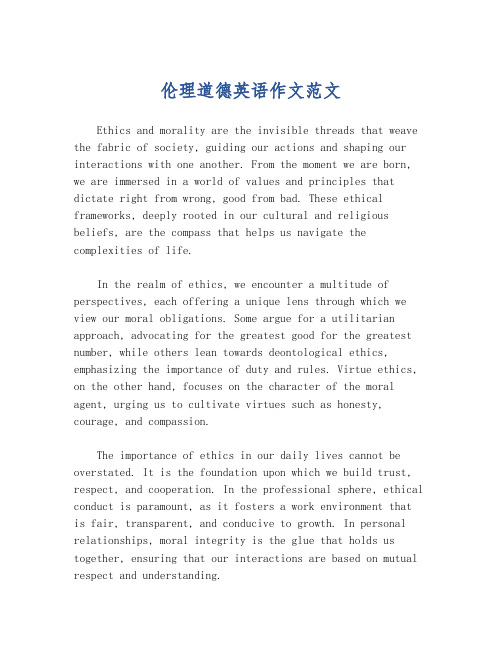
伦理道德英语作文范文Ethics and morality are the invisible threads that weave the fabric of society, guiding our actions and shaping our interactions with one another. From the moment we are born, we are immersed in a world of values and principles that dictate right from wrong, good from bad. These ethical frameworks, deeply rooted in our cultural and religious beliefs, are the compass that helps us navigate the complexities of life.In the realm of ethics, we encounter a multitude of perspectives, each offering a unique lens through which we view our moral obligations. Some argue for a utilitarian approach, advocating for the greatest good for the greatest number, while others lean towards deontological ethics, emphasizing the importance of duty and rules. Virtue ethics, on the other hand, focuses on the character of the moral agent, urging us to cultivate virtues such as honesty, courage, and compassion.The importance of ethics in our daily lives cannot be overstated. It is the foundation upon which we build trust, respect, and cooperation. In the professional sphere, ethical conduct is paramount, as it fosters a work environment that is fair, transparent, and conducive to growth. In personal relationships, moral integrity is the glue that holds us together, ensuring that our interactions are based on mutual respect and understanding.However, the complexities of the modern world often present us with ethical dilemmas that challenge our preconceived notions of right and wrong. Issues such as privacy, data security, and environmental sustainability require us to constantly reevaluate our moral stances and adapt our ethical frameworks to new challenges.Education plays a crucial role in shaping our ethical understanding. By teaching the principles of ethics and encouraging critical thinking, we can equip the next generation with the tools to make informed moral decisions. It is through education that we can instill a sense of responsibility and a commitment to upholding the values that define our society.In conclusion, ethics and morality are not static concepts but dynamic forces that evolve with time and experience. As we continue to grapple with the moral challenges of our era, it is imperative that we engage in open dialogue, foster a culture of ethical awareness, and strive to make the world a better place for all.。
- 1、下载文档前请自行甄别文档内容的完整性,平台不提供额外的编辑、内容补充、找答案等附加服务。
- 2、"仅部分预览"的文档,不可在线预览部分如存在完整性等问题,可反馈申请退款(可完整预览的文档不适用该条件!)。
- 3、如文档侵犯您的权益,请联系客服反馈,我们会尽快为您处理(人工客服工作时间:9:00-18:30)。
Education and morality 教育与道德-英语作文
Normally school education aims to cultivate students' abilities to learn and think. But more and more people
realize that without the cultivation of moral norms and ethics, we can hardly expect a society to be nice enough for leading a harmonious life. As a result, schools should attach more attention to develop students’ character education,
such as qualities of honesty and filial piety.
Character education plays an important role in the development of future society. It meets the need of emphasizing a nd developing the students’ all-round qualities. In the long run, it protects students from being selfish, indifferent, conceited as well as impolite in their daily lives. What's more, it teaches students how to learn efficiently, how to live colourfully, how to do things seriously, for their own future, and also for the future of their motherland.
平时学校教育的目的是培养学生的学习水平和思考水平。
但是,
越来越多的人意识到,没有道德规范和伦理道德的培养,我们很难指
望一个社会能够和谐生活的美好。
所以,学校应重视培养学生的人格
教育,如诚实和孝顺的品质。
品格教育在未来社会发展中起着重要的作用。
它符合强调和发展
学生的全面素质的需要。
从长远来看,它能够保护学生免受自私、冷漠、自负以及日常生活中的不礼貌。
更重要的是,教会学生如何有效
学习,如何生活丰富多彩,如何做事认真,对于自己的未来,也是祖
国的未来。
